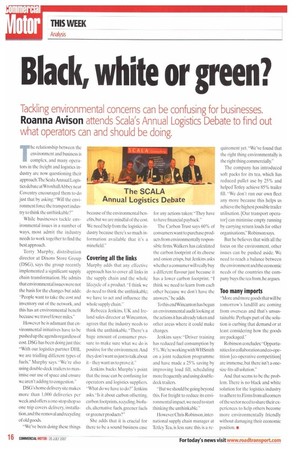Black, white or green?
Page 16

If you've noticed an error in this article please click here to report it so we can fix it.
Tackling environmental concerns can be confusing for businesses.
Roanna Avison attends Scala's Annual Logistics Debate to find out what operators can and should be doing.
The relationship between the environment and business is complex, and many operators in the freight and logistics industry are now questioning their approach.The Scala Annual Logistics debate at WroxhallAbbey near Coventry encouraged them to do just that by asking: "Will the environment force the transport industry to think the unthinkable?"
While businesses tackle environmental issues in a number of ways, most admit the industry needs to work together to find the best approach.
Terry Murphy, distribution director at Dixons Store Group (DSG), says the group recently implemented a significant supply chain transformation. He admits that environmental issues were not the basis for the changes but adds: "People want to take the cost and inventory out of the network, and this has an environmental benefit because we travel fewer miles."
However he is adamant that environmental initiatives have to he pushed up the agenda regardless of cost. DSG has been doing just this: "With our logistics partner DHL we are trialling different types of fuels." Murphy says. -We're also using double-deck trailers to maximise our use of space and ensure we aren't adding to congestion.
DSCi's home delivery site makes more than 1,000 deliveries per week and offers a one-stop shop so one trip covers delivery, installation, and the removal and recycling of old goods.
"We've been doing these things because of the environmental benefits, hut we are mindful of the cost. We need help from the logistics industry because there's so much information available that it's a minefield.
Covering all the links
Murphy adds that any effective approach has to cover all links in the supply chain and the whole lifecycle of a product. "I think we do need to think the unthinkable; we have to act and influence the whole supply chain.
Rebecca Jenkins, UK and Ireland sales director at Wincanton, agrees that the industry needs to think the unthinkable. "There's a huge amount of consumer pressure to make sure what we do is positive for the environment. And they don't want usjust to talk about it they want us to prove it.
Jenkins backs Murphy's point that the issue can be confusing for operators and logistics suppliers. "What do we have to do?" Jenkins asks. "Is it about carbon offsetting, carbon footprints, recycling. biofuels, alternative fuels, greener fuels or greener products?"
She adds that it is crucial for there to be a sound business case for any actions taken: "They have to have financial payback."
The Carbon Trust says 60% of consumers want to purchase products from environmentally responsible firms. Walkers has calculated the carbon footprint of its cheese and onion crisps, hut Jenkins asks whether a consumer will really buy a different flavour just because it has a lower carbon footprint. "I think we need to learn from each other because we don't have the answers," he adds.
To this end Wineanton has begun an environmental audit looking at the actions it has already taken and other areas where it could make changes.
Jenkins says: "Driver training has reduced fuel consumption by 5 %.We're working with WHSmith on a joint reduction programme and have made a 25% saving by improving load fill, scheduling more frequently and using doubledeck trailers.
"But we should be going beyond this. For freight to reduce its environmental impact,we need to start thinking the unthinkable."
However Chris Robinson, international supply chain manager at Tetley Tea, is less sure this is a re quirement yet. "We've found that the right thing environmentally is the right thing commercially.
The company has introduced soft packs for its tea. which has reduced pallet use by 25% and helped Tetley achieve 85% trailer fill. We don't run our own fleet any more because this helps us achieve the highest possible trailer utilisation. [Our transport operator] can minimise empty running by carrying return loads for other organisations," Robinson says.
But he believes that with all the focus on the environment, other issues can be pushed aside. We need to reach a balance between the environment and the economic needs of the countries the company buys the tea from, he argues.
Too many imports
"More and more goods that will be tomorrow's landfill are coming from overseas and that's unsustainable. Perhaps part of the solution is curbing that demand or at least considering how the goods are packaged."
Robinson concludes:-Opportunities for collaboration and co-opetition [co-operative competition] are immense, but there isn't a onesize-fits-all solution."
And that seems to be the problem. There is no black and white solution for the logistics industry to adhere to. Firms from all corners of the sector need to share their experiences to help others become more environmentally friendly without damaging their economic position. •
























































































































































































